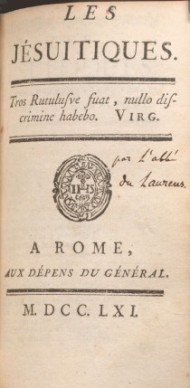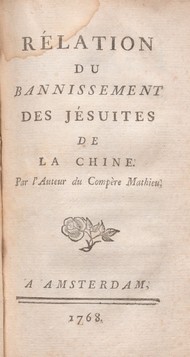By Elise Breton*
Perhaps because of his distinctive writing style, as well as his great popularity, Voltaire was often imitated as an author. Questions of dubious Voltaire authorship were an area of interest for Voltaire scholar J. Patrick Lee, whose library was recently acquired by McGill. In his article “The Apocryphal Voltaire: Problems in the Voltairean Canon,” Lee discusses several such titles that are now held in this new collection to McGill.
 As Lee noted, Voltaire had himself complained about the many works that were wrongly attributed to him [translation ours]:
As Lee noted, Voltaire had himself complained about the many works that were wrongly attributed to him [translation ours]:
On ferait une bibliothèque des ouvrages qu’on m’impute. Tous les réfugiés errants font de mauvais livres et les vendent sous mon nom à des libraires crédules. […] On me répond que c’est l’état du métier. Si c’est cela le métier est fort triste.1
[One could make a library with all the works that are attributed to me. Every wandering refugee makes a bad book and sells it under my name to gullible booksellers. […] I am told this is simply the state of the profession. If so, the profession is very sad.]
Among Voltaire’s imitators, the abbot Henri-Joseph Du Laurens was not the least talented. He copied Voltaire’s style so well that many of his works, the most famous being Le Compère Matthieu (of which Lee owned two copies), were attributed to Voltaire by his contemporaries. Other works of Du Laurens held in the Lee Voltaire Collection include editions of Les Jésuitiques, which was also for some time attributed to Voltaire. In this copy we can see that an early reader added “par l’abbé du Laurens” in manuscript on the title page.
Voltaire knew about du Laurens, as he wrote in 1768:
Il y a un théatin qui a conservé son nom de Laurent qui est assez facétieux, et qui d’ailleurs est instruit : il est auteur du compère Matthieu, ouvrage dans le goût de Rabelais, dont le commencement est assez plaisant, et la fin détestable.2
[There is a Theatine, who kept his name of Laurent, who is quite mischievous, and who is actually educated: he is the author of Compère Matthieu, a work in the style of Rabelais, of which the beginning is quite pleasant, and the end odious.]

“Perhaps in an ironic revenge for this exploitation of his name,”3 says Lee, Voltaire decided to return the favor: Voltaire’s Relation du bannissement des Jésuites de la Chine is attributed to “l’auteur du Compère Matthieu” on the title page.
These kinds of malicious false attributions of authorship are interesting to track as they are often connected with fascinating stories. And our thanks go to the rare books catalogers, who have to deal with these complicated publishing contexts!
* Elise Breton is an intern in Rare Books and Special Collections from École nationale supérieure des sciences de l’information et des bibliothèques↩
1. Letter to Damilaville, dated 17 December 1766, in Mémoires secrets (Londres, 1780), VI, 203, quoted in J. Patrick Lee, “The Apocryphal Voltaire: Problems in the Voltairean Canon,” in The enterprise of enlightenment, ed. Terry Pratt and David McCallam, (Bern: Peter Lang AG, 2004), 272.↩
2. Correspondence and related documents in The Complete Works of Voltaire, ed. Theodore Besterman, (Banbury and Oxford, 1974). Letter no. D14838, quoted in Lee’s “Apocryphal Voltaire,” 268.↩
3. Lee, “Apocryphal Voltaire,” 268.↩
